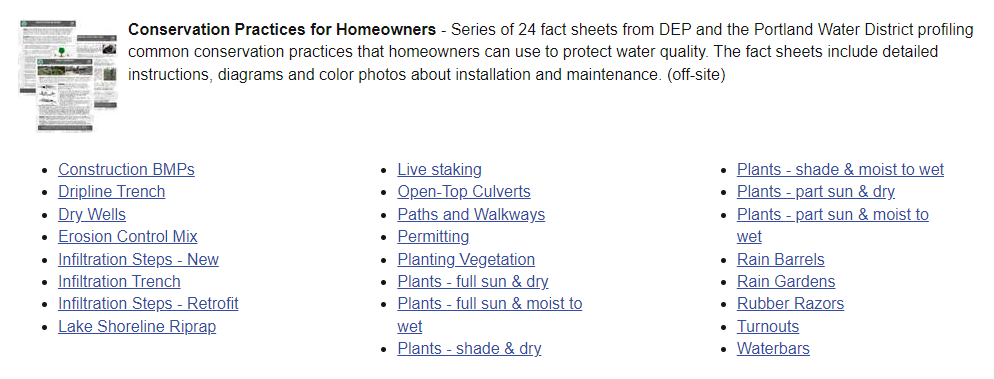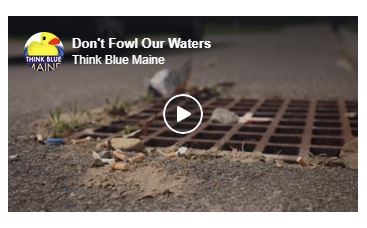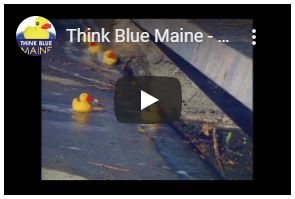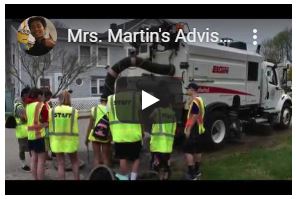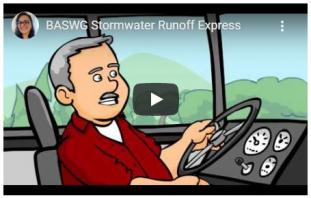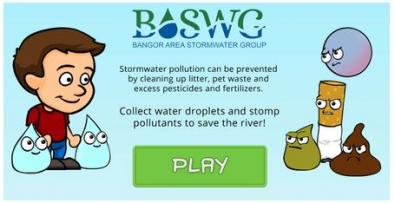Stormwater/MS4 Program
Recent Updates & Information

Stormwater Basics
What is stormwater runoff?
Stormwater runoff is precipitation (rain or melted snow) that flows over land. Storm drains collect runoff and convey it without treatment directly into waterbodies. Polluted runoff affects drinking water, human health, wildlife, and property values.
Why are stormwater drainage systems important?
Stormwater system infrastructure provides drainage that protects roads and the built environment from failure and flooding. Adequately sized drainage systems are a critical utility for new development and urban expansion.
Why is our work important?
Drainage systems require periodic rehabilitation, repair, and maintenance to continue to function effectively. In the face of changing frequency and higher intensity storms, drainage systems will be even more critical to our future economy and growth by alleviating flood risks which cause erosion and property damage. Municipalities have an important responsibility in managing and reducing the pollution in stormwater drainage systems.
What are common stormwater pollutants?
- Soil, sand, and sediments cloud the water and smother wildlife habitat.
- Chemicals (pesticides, fertilizer, weed & bug killers, vehicle fluids, coal tar pavement sealers, etc.), are carried with runoff and can be toxic to wildlife or can contribute to harmful algal growth.
- Pet waste contains bacteria that can wash into swimming areas and create health hazards and may contribute to beach closures.
- Salt, which is spread on roads, sidewalks, and parking lots to melt snow and ice, dissolves in water or snowmelt. Once salt gets into our water it cannot be removed. Salt in our waterways can be toxic to wildlife.
- Debris, like cigarette butts, household trash and other forms of litter, is unsightly and can harm wildlife.
MS4 General Permit Basics
What is an MS4?
Municipal Separate Storm Sewer System, or MS4, means a stormwater conveyance that is separated from sanitary sewer systems. The storm sewer systems includes roads, curbs and gutters, ditches, catch basins, storm drains, outfalls, and pipes connecting these features.
Kittery is subject to a Clean Water Act Permit, administered by the Maine Department of Environmental Protection (DEP), that allows the Town to discharge runoff into waterbodies if measures are taken to minimize pollution from the storm sewer system and municipal facilities and operations. This permit is referred to as the MS4 General Permit.
Under the Federal Clean Water Act, some municipalities must have a permit that allows them to direct stormwater to waterbodies in their communities, provided that specific steps are taken to minimize pollution. Implementation of these steps is mandatory for Kittery. A municipality-wide effort is needed to meet permit requirements.
Who is Regulated?
Municipalities, transportation agencies, public universities, prisons, military bases and other state and federal facilities are subject to MS4 General Permit regulation. Regulated municipalities are determined by population density and proximity to population density, based on US Census Bureau data. The regulated municipalities in Maine include:
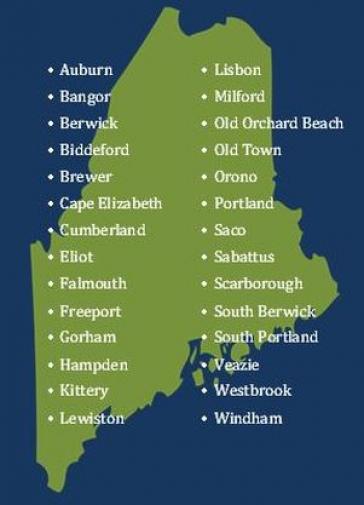
What does it mean for Kittery?
As a regulated municipality, Kittery is subject to:
- Full compliance with permit requirements, including six minimum control measures outlined in the permit. Permit requirements are subject to change and may increase with each permit cycle.
- Higher costs (operational, permitting, capital improvements, etc.) than non-regulated municipalities.
- Heightened scrutiny from Maine DEP, EPA, and environmental or citizen action groups.
- Identification and improvement of the municipality's priority waterbody, in Kittery the priority waterbody is Spruce Creek.
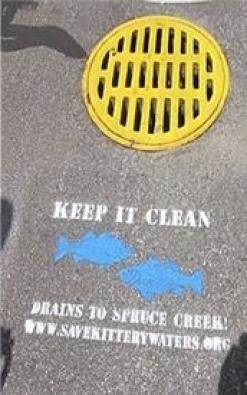
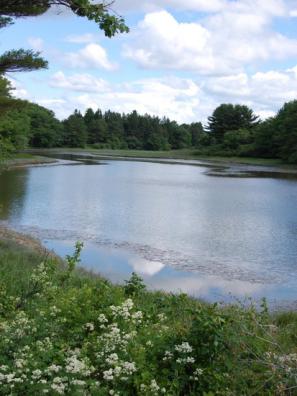
MS4 General Permit Requirements
Owners/operators of regulated municipal separate storm sewer systems (MS4s) are required to develop, implement, and enforce a stormwater management program (SWMP). The focus of the SWMP is to describe how the MS4 will reduce the discharge of pollutants from its sewer system and addresses these six minimum control measure program areas:
- Implement public education programs to help the community and municipal officials understand their roles in keeping stormwater clean.
- Provide opportunities for the public to participate in program development and implementation.
- Identify and eliminate illegal sewer connections, illicit dumping into stormdrains, and other sources of pollution. Carry out long-term maintenance and mapping of all stormwater infrastructure.
- Ensure that construction on both public and private property do not pollute runoff with sediments and debris.
- Ensure that new development and redevelopment control and treat runoff before it leaves private property.
- Engage in municipal roadway best practices such as cleaning drainage systems, sweeping streets, and ensuring municipal activities do not contribute to stormwater pollution.
Regulated municipalities can find guidance on how best to comply with these minimum control measures through the Think Blue Maine Municipalities website.
Consequences for failure to comply with the MS4 General Permit can include:
- Enforcement Action
- Notice of Violation, fines or other penalties
- Consent Order
- Prosecution
- Permit Termination or Revocation
- Permit modification
- Stricter permit limits
- Denial of permit renewal
- Most importantly - jeopardized public health and safety
Kittery must adopt increased stormwater standards applicable to:
- New development, redevelopment, and construction
- Long-term maintenance and inspection of stormwater infrastructure
- Preventing pollution from all municipal operations and facilities
- Improving polluted waterbodies within the municipality, with priority given to Spruce Creek
- Raising awareness of stormwater, specifically the appropriate practices that should be used, inspected, and maintained on a regular basis to reduce polluted runoff
How is Kittery meeting these Clean Water Act requirements?
MS4 Program Manager
Primary Point of Contact: Jessa Kellogg, Public Works Inspector
- Oversees inspection and maintenance of municipal stormwater infrastructure.
- Oversees creation and updating of stormwater infrastructure maps.
- Coordinates implementation of Kittery's Stormwater Management Plan through coordination with all municipal departments and serves as the stormwater point of contact (POC) with DEP.
- Identifies possible pollution sources within the community and works to eliminate these sources.
- Ensures staff are trained in proper procedures for minimizing pollution, including but not limited to: chemical storage, spill prevention and clean up, and use of erosion control measures.
- Works with Planning and third party reviewers to ensure site plan proposals contain appropriate erosion and sediment control plans, stormwater designs that appropriately collect and treat stormwater, and post-construction monitoring plans.
- Requires that a third party inspector review construction activities for compliance with the plans that were submitted and approved.
- Through technical review and permitting follow-up, ensures stormwater systems are maintained and functioning after construction is complete.
- Enforces the non-stormwater discharge ordinance when necessary.
- Conducts opportunistic and regularly scheduled inspections of outfalls, ditches, and catch basins to assess for illicit discharges and maintenance needs.
Public Works
- Follow pollution prevention measures at the parks and recreation facilities, public works garage and transfer station to ensure that municipal operations at these facilities do not pollute nearby water resources.
- Use proper erosion and sedimentation control measures during construction and maintenance.
- Conduct opportunistic and regularly scheduled inspections of outfalls, ditches, and catch basins to assess for illicit discharges and maintenance needs.
Planning
- Ensures site plans contain all proper submittals including erosion and sedimentation control plans and stormwater management plans where required.
- Informs developers or applicants of construction and post-construction requirements when applicable.
- Informs developers of the benefits of using Low Impact Development, which minimizes environmental impact from development.
Code Enforcement
- Inspects small-scale (e.g. single family homes) construction projects (on both public and private property) to ensure proper erosion and sedimentation control practices are being used and pollutants are not entering the Town's MS4.
- Identifies possible pollution sources within the community and notifies the Stormwater Program Manager.
- Informs developers or applicants of construction and post-construction requirements when applicable.
Public Safety - Police and Fire
- Follows operation and maintenance plans for their facilities to ensure activities do not pollute water resources.
- Identifies possible pollution sources within the community and notifies the Stormwater Program Manager.
- Ensures staff are trained for minimizing pollution, including: chemical storage and spill prevention and clean-up.
Proper Pet Waste Disposal and Reducing Cigarette Littering
Kittery teams with four other towns who are also regulated for stormwater to implement a public education program focused on proper pet waste disposal and reduction of cigarette related litter. We have identified that both are water quality issues in Kittery through surveying different areas of town. The Southern Maine Stormwater Working Group (SMSWG) website has a LitteRadar page showing details about where we found these types of litter. Visit SMSWG - Southern Maine Stormwater Working Group to see where litter has accumulated in our town and what it consists of (and yes, we picked up whatever we logged!).
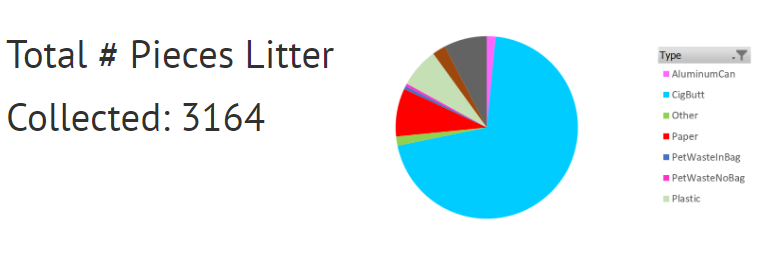

YardScaping Resources
YardScaping is Kittery's healthy lawn care education program. Weed and bug killers can harm our children and pets, and fertilizer can pollute our water. YardScaping practices build healthy soil to grow a beautiful lawn without weedy and bug killers and with reduced use of fertilizer.
Homeowners can learn more about the Yardscaping program through viewing the recording of the recent April 14, 2022 Yardscaping Webinar.
Homeowners can find guidance and resources at the Think Blue Maine Residents website or the below Yardscaping Fact Sheets courtesy of the Cumberland County Soil & Water Conservation District.
Maine DEP Homeowner Resources
Maine DEP Manuals and Guides to Reduce Water Pollution 
Informational Videos
Stormwater Hotline
To report an illicit discharge please call:
- Public Works Stormwater Hotline at (207) 439-0333 or
- MS4 Program Manager Jessa Kellogg directly at (207) 752-7242.






